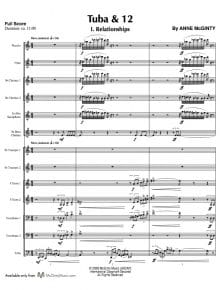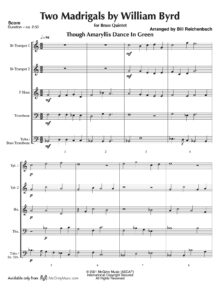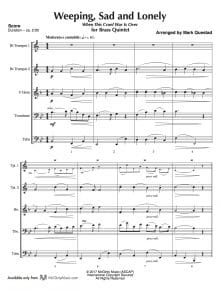Search Music
Music Categories
PDF Download Only
Purchase. Print. Play.
-
Tuba & 12 – Mixed Large Ensemble
Tuba & 12 was inspired by a Bedouin proverb that states: “While the words are yet unspoken, you are master of them; when once they are spoken, they are master of you.”
Proverbs, in general, state a general piece of advice. This piece assumed that words were spoken, resulting in tension and an apology. Relationships, the first movement, has brass vs. woodwinds, tonality vs. dissonance, duples vs. triplets, et al. as well as the synergy and cooperation among all. Unspoken Words is the second movement and the dissonant opening theme in the piccolo and flute is presented three times. The third movement is Resolution. Over a constant low pedal G, the horn ostinato adds tranquility as all the themes from the first two movements return in fragmented form, before all is finally resolved.
Although tuba has top billing in the title, each instrument is equally important.
The sample score shows the first page of each of the three movements. The complete recording is available for free.
Composer: Anne McGinty
Instrumentation: Piccolo, Flute, 2 Clarinets, Alto Saxophone, Bass Clarinet, 2 Trumpets, 2 Horns, 2 Trombones & Tuba
Duration/# of Pages: ca. 11:00 / 75 pages, 8.5″ x 11″
Key: N/A -
Two Madrigals by William Byrd – Brass Quintet
William Byrd, 1539/40 – 1623, was the leading English composer of his generation, and was a protegé of Thomas Tallis. In 1575 Queen Elizabeth I granted them a monopoly for printing, publishing and selling music and music paper.
He wrote extensively for every medium then available, except lute. Byrd is beast known for the development of the English madrigal.
This arrangement by Bill Reichenbach remains faithful to Byrd’s original music, and the brass quintet instrumentation adds color and dynamic shading to intensify the expressive qualities of the music. The two madrigals are Though Amaryllis Dance In Green and In Fields Abroad.
The excerpt includes the full versions of both pieces. It’s midi, using Note Performer, and will give you a preview of what your brass quintet may sound like.
Composer: Bill Reichenbach
Instrumentation: 2 Bb Trumpets, F Horn, Trombone, Bass Trombone/Tuba
Duration/# of Pages: ca. 2:50 / 14 pages, 8.5″ x 11″
Key: N/A -
Weeping, Sad and Lonely – Brass Quintet
Weeping, Sad and Lonely (also known as When This Cruel War Is Over) is a ballad that was popular during and after the American Civil War in both northern and southern states, a fitting selection for any Memorial Day celebration. In this treatment the plaintive melody is given an accompaniment reminiscent of the “American Brass Band Journal.”
The music was written by Henry Tucker, the lyrics by Charles Carroll Sawyer.
The lyrics are:
Dearest Love, do you remember, when we last did meet,
How you told me that you loved me, kneeling at my feet?
Oh! How proud you stood before me, in your suit of blue,
When you vow’d to me and country, ever to be true.CHORUS: Weeping, sad and lonely, hopes and fears how vain!
When this cruel war is over, praying that we meet again.When the summer breeze is sighing, mournfully along,
Or when autumn leaves are falling, sadly breathes the song.
Oft in dreams I see thee lying on the battle plain,
Lonely, wounded, even dying, calling but in vain.
CHORUS: Weeping, sad and lonely, hopes and fears how vain!
When this cruel war is over, praying that we meet again.If amid the din of battle, nobly you should fall,
Far away from those who love you, none to hear you call —
Who would whisper words of comfort, who would soothe your pain?
Ah! The many cruel fancies, ever in my brain.
CHORUS: Weeping, sad and lonely, hopes and fears how vain!
When this cruel war is over, praying that we meet again.But our Country called you, Darling, angels cheer your way;
While our nation’s sons are fighting, we can only pray.
Nobly strike for God and Liberty, let all nations see
How we loved the starry banner, emblem of the free.
CHORUS: Weeping, sad and lonely, hopes and fears how vain!
When this cruel war is over, praying that we meet again.The mp3 excerpt is performed by the Sine Nomine Brass Quintet. (Used with permission.)
Composer: Mark Questad
Instrumentation: 2 Bb Trumpets, F Horn, Trombone & Tuba
Duration/# of Pages: ca. 2:00 / 9 pages, 8.5″ x 11″
Key: Bb



